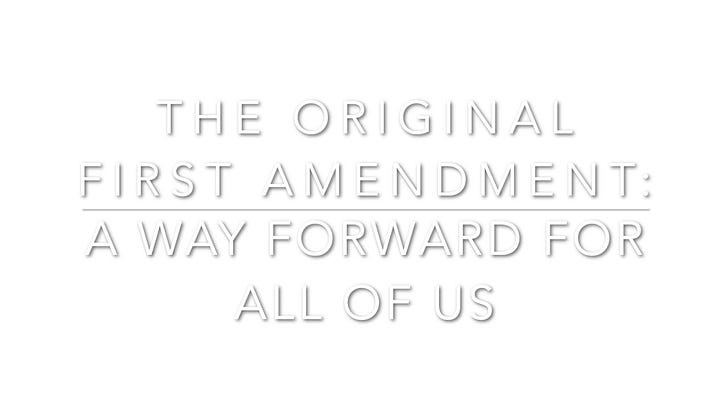Strange New (Old) Ideas Revolution vs. Conservation
Originally sent as a newsletter to friends on 29 July 2021
Dear Friends Who Care About Politics,
You are people who love your country and want what's best for it, even listening to strange new (old) ideas.
You have put up with a lot of enthusiasm from me, and have helped me all along the way with good questions, and good counsel. Thank you! To those of you who have shared this video talk, thank you. You've made it possible for it to be viewed over 100 times, by over 70 people, certainly more than I could have done in person.
Some reactions to the talk I gave on the Original First Amendment have started coming in, and that is really helpful.
Here's what I'm hearing: the Original First Amendment is too radical for some people, and not radical enough for others. Some say, "This idea is dangerous, and could cause major problems." Others say, "This idea doesn't go far enough. Our problems are so serious right now that what we need is a total overhaul."
Well, what if they're right? I've been thinking about two opposing impulses that are at work in our politics. I'm calling one "the revolutionary impulse" and the other, "the conservative impulse." This Conservative Impulse is the thing that says, "What we have now is pretty great. Let's not break it." This is an important impulse, because without it, we'd be far too quick to jump on any supposed innovation that came along, without considering what might be lost in the process. Anyone who is invested in the status quo feels the need for the system to keep functioning as it does. A government that is reliable, even reliably bad, has its merits.
The opposing impulse is the Revolutionary Impulse.
This is the thing inside all of us that recognizes when something isn't right, and ought to change. For example, over time, most Americans became convinced of the immorality of keeping blacks as slaves. This was a revolution in thought. (I think Progressives would call this Progress, but I am trying to describe something distinct from the Modern and Post-modern expressions of Progress.) Men became convinced of women's right to vote.
What if the Original First Amendment doesn't go far enough? Is that a reason to stop it? For me, there are other changes that I would like to see made: possibly the repeal of the 17th Amendment. Definitely, a pullback of the modern administrative state. But if I can't have everything I want, should I give up on the thing I could have if I focus on it and work toward it? I have a motto around here for housekeeping and for school, "Don't let the thing you can't do get in the way of the thing you can." The folks in this camp are our dreamers, our revolutionaries. We need them.
Now to the Conservatives: does the Original First Amendment change too much at once? Well, maybe. It would certainly shake things up. Depending on how long the state-by-state ratification process takes, and how prepared the current two major parties are for it, it might make room (gasp!) for a third party that could side with one side on certain issues, and side with the other on other issues. Alternatively, it could lead to the elite in each party growing ever more powerful/vindictive, because members would rely on just a few to do the thinking and then just take their word for it when the time comes to vote on legislation. It could lead to some rule changes in the House. There are many possible outcomes, which are impossible to predict in full.
However, I trust that the mechanism itself is sound. The breakdown of trust between ourselves and our government is serious. I think that mistrust is born, in part, from distance. We need to bring the citizens closer to the powers that be, and vice versa. I think the Original First Amendment would do that. So did George Washington. It might be a bit messy. We might have unforeseen consequences to deal with, but I trust the Founders and Framers more than I trust the status quo.
If you feel comfortable doing so, please go ahead and share the link to this talk on your social media. I like to warn people that the audio quality is harsh. Please welcome and pass along any questions or comments that you find interesting.


